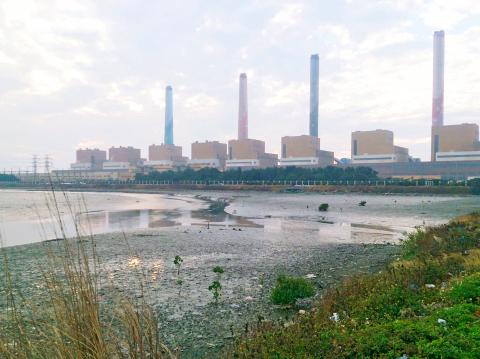Taiwan Power Co (Taipower) yesterday lowered output at the Taichung Power Plant in response to increased air pollution in central and southern Taiwan, while environmentalists said the company should shift to cleaner energy.
The power plant — the largest coal-fired plant in the world — reduced its power generation by about 5 percent from 11:50am to 6pm in an attempt to reduce its carbon emissions, Taipower said, adding that the plant was producing about 820,000 kilowatts (kW) less than its average 5.5 million kW per day, although one generator was also shut down for annual maintenance.
The output reduction was in accordance with an agreement the state-run company reached with the Taichung City Government. The agreement states that the plant should operate at a reduced capacity when concentrations of PM2.5 — fine particulate matter smaller than 2.5 micrometers — reach 71 micrograms per cubic meter at most of the city’s 11 monitoring stations, according to Taipower.

Photo: Huang Chung-shan, Taipei Times
The city government requested that Taipower lower output at the Taichung Power Plant yesterday morning when the index for PM2.5 hit “extremely high” levels. The index fell to a “medium” level in the afternoon.
Poor air quality is expected to persist in western parts of Taiwan and the outlying island of Kinmen until tomorrow, the Environmental Protection Administration said.
Taiwan Healthy Air Action Alliance convener Yeh Guang-peng (葉光芃) said that the company should cut power generation in winter and during holidays when electricity demand is low.
“Taipower should reduce output at its coal-fired plants when PM2.5 levels reach ‘medium’ levels or three days before predicted peak pollution days,” Yeh said, adding that more active measures should be in place to reduce air pollution when the PM2.5 index reaches excessive levels.
“The company should raise output of natural gas-powered plants and shift to cleaner energy, he said. “More than 70 percent of people are willing to pay higher electricity prices if that would be better for health and the environment [according to a poll by the Chinese-language Global Views Monthly last month]. Taipower should respond to the public’s expectation.”
Only 30 percent of the nation’s gas-powered plants are active in winter, and pollution would be sufficiently reduced if all those plants could run at full capacity all year round, he added.

Taiwanese can file complaints with the Tourism Administration to report travel agencies if their activities caused termination of a person’s citizenship, Mainland Affairs Council Minister Chiu Chui-cheng (邱垂正) said yesterday, after a podcaster highlighted a case in which a person’s citizenship was canceled for receiving a single-use Chinese passport to enter Russia. The council is aware of incidents in which people who signed up through Chinese travel agencies for tours of Russia were told they could obtain Russian visas and fast-track border clearance, Chiu told reporters on the sidelines of an event in Taipei. However, the travel agencies actually applied

Japanese footwear brand Onitsuka Tiger today issued a public apology and said it has suspended an employee amid allegations that the staff member discriminated against a Vietnamese customer at its Taipei 101 store. Posting on the social media platform Threads yesterday, a user said that an employee at the store said that “those shoes are very expensive” when her friend, who is a migrant worker from Vietnam, asked for assistance. The employee then ignored her until she asked again, to which she replied: "We don't have a size 37." The post had amassed nearly 26,000 likes and 916 comments as of this

New measures aimed at making Taiwan more attractive to foreign professionals came into effect this month, the National Development Council said yesterday. Among the changes, international students at Taiwanese universities would be able to work in Taiwan without a work permit in the two years after they graduate, explainer materials provided by the council said. In addition, foreign nationals who graduated from one of the world’s top 200 universities within the past five years can also apply for a two-year open work permit. Previously, those graduates would have needed to apply for a work permit using point-based criteria or have a Taiwanese company

The Shilin District Prosecutors’ Office yesterday indicted two Taiwanese and issued a wanted notice for Pete Liu (劉作虎), founder of Shenzhen-based smartphone manufacturer OnePlus Technology Co (萬普拉斯科技), for allegedly contravening the Act Governing Relations Between the People of the Taiwan Area and the Mainland Area (臺灣地區與大陸地區人民關係條例) by poaching 70 engineers in Taiwan. Liu allegedly traveled to Taiwan at the end of 2014 and met with a Taiwanese man surnamed Lin (林) to discuss establishing a mobile software research and development (R&D) team in Taiwan, prosecutors said. Without approval from the government, Lin, following Liu’s instructions, recruited more than 70 software